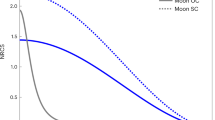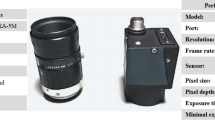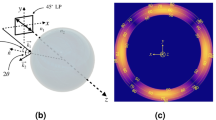Abstract
MEASUREMENTS on the polarization of radio waves reflected from meteorological precipitation are sometimes handicapped by limitations of the investigating radar, and this is particularly so in the case of so-called circularly polarized radars. In practice, all radars radiate an elliptically polarized wave, and it can be shown that a perfectly spherical target will appear to produce two orthogonally polarized circular components differing in magnitude by 40 dB. if the voltage ellipticity ratio of the radiated wave is 0.99, and by 20 dB. if the ellipticity ratio is 0.9. This sets a limit to the accuracy obtainable in field measurements.
This is a preview of subscription content, access via your institution
Access options
Subscribe to this journal
Receive 51 print issues and online access
$199.00 per year
only $3.90 per issue
Buy this article
- Purchase on Springer Link
- Instant access to full article PDF
Prices may be subject to local taxes which are calculated during checkout
Similar content being viewed by others
References
Browne, I. C., and Robinson, N. P., Nature, 170, 1078 (1952).
Author information
Authors and Affiliations
Rights and permissions
About this article
Cite this article
HUNTER, I. Polarization of Radar Echoes from Meteorological Precipitation. Nature 173, 165–166 (1954). https://doi.org/10.1038/173165b0
Issue Date:
DOI: https://doi.org/10.1038/173165b0
This article is cited by
-
The Anisotropy of Precipitation Media
Nature (1972)
Comments
By submitting a comment you agree to abide by our Terms and Community Guidelines. If you find something abusive or that does not comply with our terms or guidelines please flag it as inappropriate.



